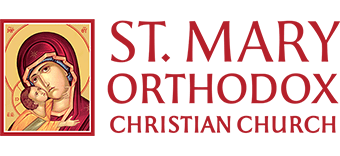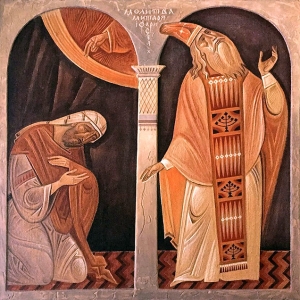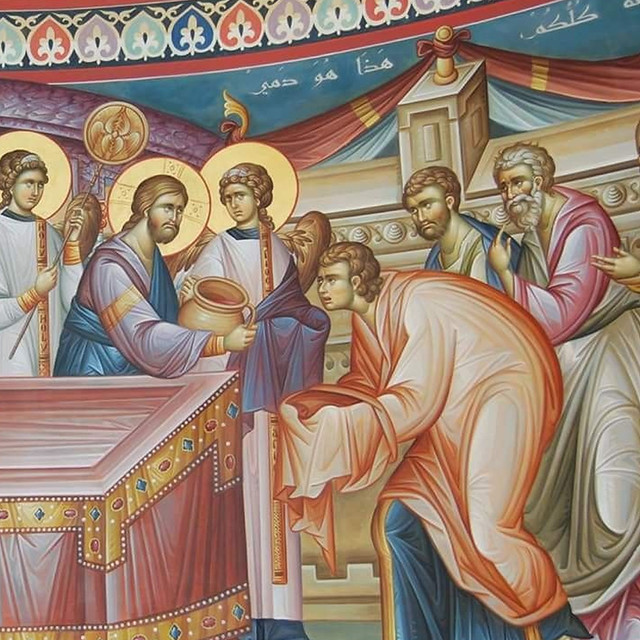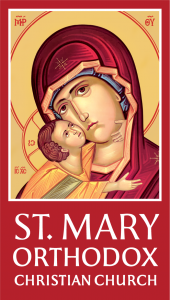The Renewal of Pascha By Metropolitan Saba (Isper)
Pascha is here again. It is a season dear to all of us, bringing us face-to-face with the reality of the salvation that Christ gave us through his voluntary death and glorious resurrection. Today, we renew our hope in the value of life. Today, we straighten our path toward true life. Today we understand that eternal life is our goal; and that our earthly life, with all its joys and sorrows, becomes true life when we live it as eternal life here and now.
In the light of the Resurrection, we examine our faith, our behavior, and our condition. Are these leading us to experience eternal life now in the active, living and revitalizing presence of God? Christ did not endure His passion to give us only a happy life which passes after a few decades. He fulfilled His divine plan to make this earthly life a gateway to eternal life. In us, the children of the Resurrection, the world begins its passage to eternity.
The pains, injustice, and desecration of people’s lives and dignity throughout history, and still today, should rather draw us to search for the real meaning of life. This world will vanish sooner or later. Therefore, we should not be short-sighted for earthly things while forgetting the authentic life ahead of us. The believer does not fear death, but sin. This means he does not fear the loss of earthly life, but the loss of life with God. By the power of the Resurrection, we confront death, armed with the invincible hope that eternal life will prevail over it.
The Resurrection of Christ means that despair has no place among us. No matter how much adversity and darkness, the light of the Resurrection remains our invincible guide. Christ did not endure great suffering in vain before He died and arose. His Resurrection happened after passing through brutal Golgotha. The sufferings of this age, no matter how severe, are nothing compared to the joy of the age to come, as the Apostle Paul teaches us.
We believe that we witness our own resurrection before the general resurrection, but only if we become completely purified from our passions. We do not tire of rising after every fall until we reach the great goal. Our conviction is that there is no salvation for this world except through our risen Lord. The more disappointments we have, the more we cling to this goal, and in Christ’s Resurrection we have inexhaustible hope and power.
Let us arm ourselves with the Resurrection, the cornerstone of our faith, and with it let us drive out despair, fight against fear, and renew our striving to manifest eternal life now. Let us espouse faith with works, and words with deeds. Let us bring the splendour of our liturgical services to our society. We must never stop trying to live our Christian faith, and all other things shall be added to you (cf. Matt. 6:33).
On this greatest feast day, we should rebuild our love that had been shattered by fear, and look not only to ourselves but to others in need of the true breath of life. Let us remember that human beings are made for infinite love. In Christ, God is near us, and so are others. Please strive to recognize that you are one family, that you are responsible for each other because you are brethren of the one Father. We should intensify our prayers and abstain from sin while asking for God’s mercy. If we are truly children of the Resurrection, let us be witnesses to the culture of eternal life – for which we hope and strive – for all peoples, especially the suffering.
Today, we must proclaim and manifest the great joy of the Resurrection. We must make it shine through the beauty of our lives and our holy, prophetic witness in speaking the truth with love. We must proclaim the joy of the Resurrection and let it shine every day, as we strive with others to spread peace, justice, and joy in every suffering and oppressed land. We must proclaim the joy of the Resurrection, and let it shine through our persistent resistance to sin and death, within us and around us.
Let us reflect together and ask on this feast: How can we be witnesses of the Resurrection in our own life and in the suffering world?
On Pascha, let us bring to the risen Lord our intentions and hopes. Then, let us employ our abilities to help others rise from their various sufferings.
We celebrate this holy feast in the hope of the resurrection of mankind from all manners of death.
Christ is risen! Indeed, He is risen!

 A New Pharisaism~By Metropolitan Saba (Isper)
A New Pharisaism~By Metropolitan Saba (Isper) (
(